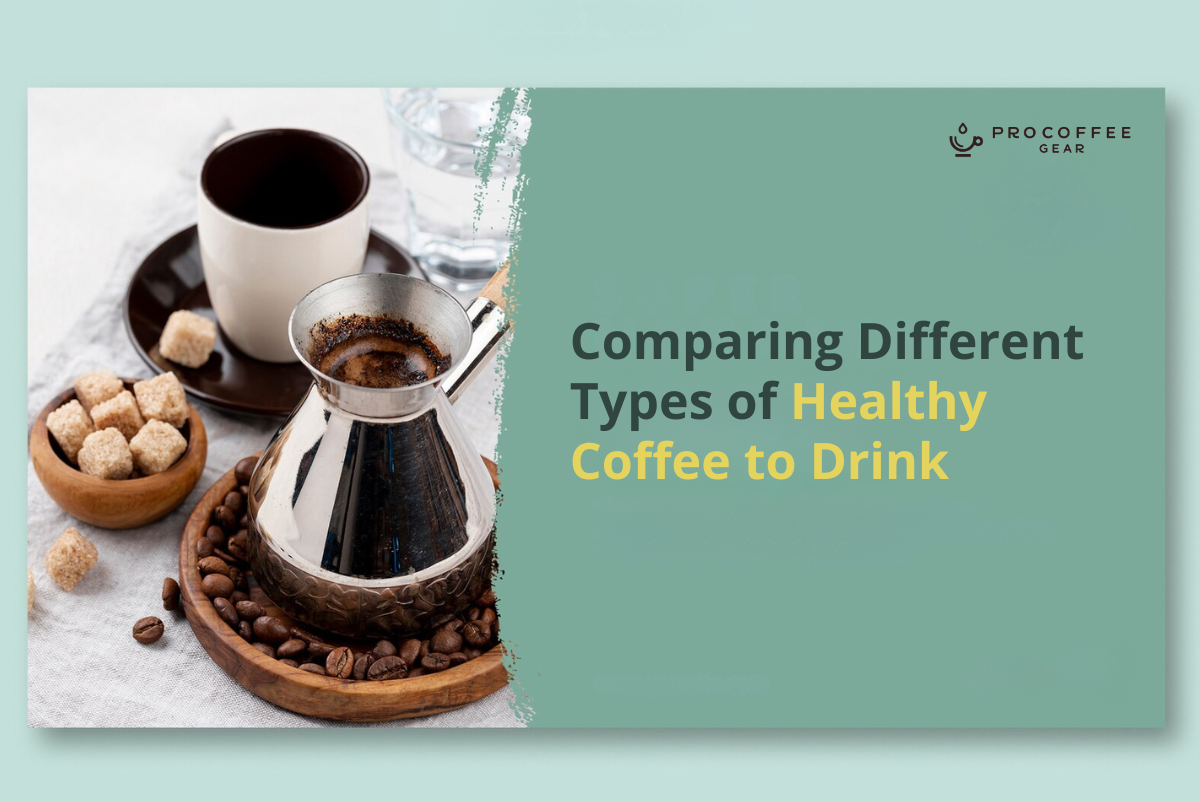
Comparing Different Types of Healthy Coffee to Drink
|
|
Time to read 3 min
Your Cart
Your cart
|
|
Time to read 3 min
Coffee is more than just a morning ritual—it’s packed with antioxidants, boosts brain function, and even supports heart health. But not all coffee is created equal. The brewing method, bean type, and additives can make a huge difference in determining if your cup is a healthy or unhealthy choice. If you want to maximize the benefits while minimizing the downsides, here’s what you need to know about the healthiest coffee.
If health is your top priority, black coffee is the best option. It contains zero calories, no added sugars, and a high concentration of antioxidants. Studies show that regular black coffee consumption may lower the risk of type 2 diabetes, Alzheimer’s, and liver disease.
Why It’s Healthy:
No added sugars or fats
High in polyphenols and antioxidants
Supports brain and heart health
Boosts metabolism and fat-burning
Best Brewing Methods:
Drip Coffee (Filtered): Removes harmful diterpenes that can raise cholesterol.
Espresso: High in antioxidants, but be mindful of quantity due to concentrated caffeine.
French Press: Richer in flavor, but retains more oils that may impact cholesterol levels.
Your choice of beans affects both flavor and health benefits.
Healthiest Coffee Beans
Arabica Beans – Lower caffeine content, smoother taste, and rich in antioxidants.
Single-origin beans – Fewer contaminants, better quality control, and more consistent benefits.
Organic Coffee – Grown without pesticides, reducing potential chemical exposure.
Pro Tip: Opt for shade-grown, organic, and fair-trade certified coffee to ensure the highest quality.
A healthy coffee can quickly turn unhealthy with the wrong additions.
Avoid These Additives:
Sugar & Artificial Sweeteners – Spikes blood sugar, increases risk of metabolic issues.
Flavored Syrups – High in processed sugars and artificial chemicals.
Heavy Cream & Artificial Creamers – Loaded with unhealthy fats and additives.
Healthier Alternatives:
Unsweetened Plant-Based Milks – Almond, oat, or coconut milk add creaminess without excess calories.
Natural Sweeteners – Stevia, monk fruit, or a small amount of raw honey.
Spices & Superfoods – Cinnamon, turmeric, or cacao add antioxidants and anti-inflammatory benefits.
Different brewing methods affect the nutritional profile of your coffee.
|
Brewing Method |
Health Benefits |
Considerations |
|
Drip (Filtered) |
Removes oils linked to high cholesterol |
It may strip some beneficial compounds |
|
Espresso |
High in antioxidants, low volume |
High caffeine content per ounce |
|
French Press |
Full-bodied flavor, rich in oils |
Retains cafestol, which may raise cholesterol |
|
Cold Brew |
Lower acidity, smooth taste |
Higher caffeine concentration |
|
AeroPress |
Quick, portable, and produces clean coffee |
Requires manual effort |
While coffee has numerous benefits, excessive caffeine can lead to jitteriness, insomnia, and digestive discomfort. The FDA recommends limiting caffeine intake to 400mg per day (about 4-5 cups of coffee). If you’re sensitive to caffeine, opt for:
Half-Caff Blends – A mix of regular and decaf coffee.
Swiss Water Process Decaf – Preserves antioxidants without chemical solvents.
Mushroom Coffee – A lower-caffeine alternative with added cognitive benefits.
Drinking coffee the right way can enhance health, support metabolism, and provide long-lasting energy. The key is to keep it simple: stick to black coffee or minimally processed additions, choose high-quality beans, and opt for a brewing method that aligns with your health goals.
Invest in the right tools if you're serious about making the healthiest cup.
At Pro Coffee Gear, we offer premium coffee grinders, brewers, and accessories to elevate your home coffee experience.
If you’re looking to take your coffee experience to the next level, explore Pro Coffee Gear’s collection of premium coffee machines, grinders, and accessories designed to suit every type of coffee drinker. Get your favorite espresso shot today!
A: The healthiest options include stevia, monk fruit, or a small amount of raw honey. Avoid artificial sweeteners and refined sugars.
A: Decaf retains most of the antioxidants but has significantly less caffeine. Choose Swiss Water Process decaf for the best quality.
A: Not necessarily. Unsweetened almond, oat, or coconut milk can be good choices, but heavy cream and artificial creamers should be avoided.
A: Opt for cold brew, add a pinch of baking soda, or choose low-acid coffee beans.
A: Up to 3-4 cups per day is generally considered safe and even beneficial for most adults.